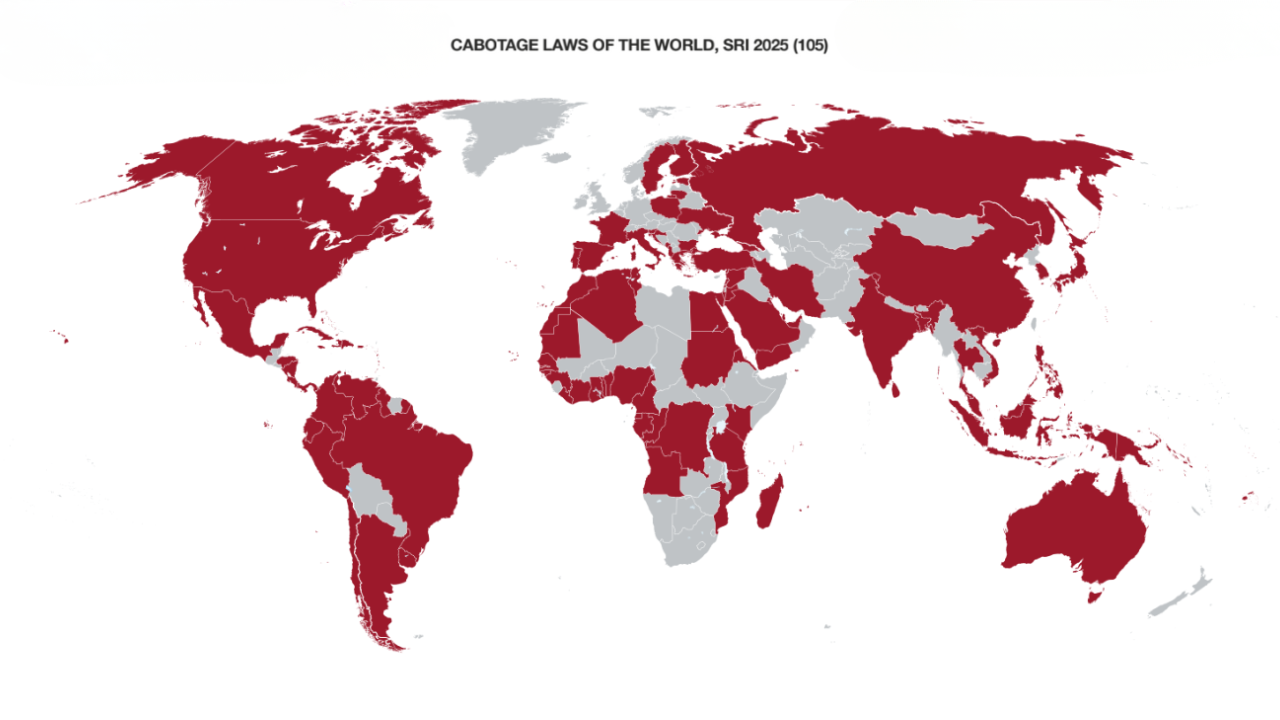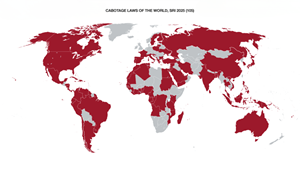ITF-Released Report Shows a Growing Number of Countries Are Implementing Cabotage Laws
WASHINGTON, Oct. 22, 2025 (GLOBE NEWSWIRE) -- The American Maritime Partnership announces today that a newly released study by Seafarers' Rights International (SRI) finds that cabotage laws now exist on 85% of the world’s coastlines, are growing in number at an unprecedented pace, and are increasingly essential to national security, economic stability and maritime resilience.
The Cabotage Laws of the World (2025) report, commissioned by the International Transport Workers' Federation (ITF), compares nations in their enforcement of cabotage laws, which restrict the waterborne transportation of goods or passengers between two points within the same country to domestic carriers. This ensures that critical services remain reliable within a country in times of crisis.
The number of countries with cabotage laws has increased from 91 in 2018, when the report was last conducted, to 105 in 2025. While changes between 2018 and 2025 were expected, according to the report, “cabotage laws were found to have spread around the world faster than ever before in the centuries-long history of cabotage.”

“Countries appear no longer to be viewing cabotage as merely economic policy, but also as essential to national security and strategic autonomy in an increasingly unstable geopolitical environment,” said Deirdre Fitzpatrick, co-author of the report and Executive Director of SRI. “These 105 nations represent a remarkably diverse group controlling 85% of the global coastline. We are proud that interest in our first report appears to have translated into concrete action, with nations strengthening maritime strategies for a world grown more uncertain since the pandemic.”
For the United States, maritime cabotage is governed by the Jones Act, a cornerstone law passed in 1920 that ensures America’s domestic shipping is strengthened by requiring vessels transporting cargo between U.S. ports to be U.S.-built, U.S.-owned, U.S.-flagged and U.S.-crewed. Similar laws exist for airplanes, trains and trucks transporting cargo in the country.
“This report provides a compelling and independent affirmation of what the maritime community has long recognized — the Jones Act serves the best interests of the United States, its mariners, and our economic and national security,” said David Heindel, President of the Seafarers International Union and Chair of the ITF Seafarers’ Section. “The United States remains the global benchmark for strong cabotage and maritime policy, and it is no surprise that nations confronting today’s geopolitical challenges are reinforcing their own cabotage frameworks to preserve sovereignty and safeguard critical maritime infrastructure.”
“The United States must take the lead in securing our own maritime border and domestic supply chain and not let foreign governments or foreign carriers decide our fate. Just as we wouldn’t allow foreign airlines to transport passengers between U.S. cities or foreign trucks to ply U.S. highways, the same principle has long applied for maritime,” said Jennifer Carpenter, President of the American Maritime Partnership. “We are grateful that President Trump and a strong bipartisan majority in Congress understand the importance of putting America First and preserving U.S. control over our waterways.”
The Jones Act supports an estimated 650,000 jobs and contributes $150 billion to the U.S. economy annually. This law also contributes to the strategic sealift capacity needed for America’s armed forces.
As the international community increasingly turns toward cabotage to safeguard its maritime sectors and “contest the emergence of the new global geopolitical order,” according to study authors, the United States stands not only as a leader but as a model, with approximately 40,000 vessels in the Jones Act fleet.
Additional nations with strong cabotage laws similar to the United States’ Jones Act include South Korea, Japan, Israel, Brazil, Turkey and even China, among many other nations.
- The American Maritime Partnership (AMP) is the voice of the U.S. domestic maritime industry. More than 40,000 American vessels built in American shipyards, crewed by American mariners, and owned by American companies, operate in our waters 24-hours a day, seven days a week. This commerce sustains nearly 650,000 American jobs, $41.6 billion in labor compensation, and more than $154.8 billion in annual economic output. Learn more by visiting www.americanmaritimepartnership.com.
Contact: AMP@Nahigianstrategies.com
A map accompanying this announcement is available at https://www.globenewswire.com/NewsRoom/AttachmentNg/9c732273-d284-4f9e-bcf2-3ca4435208fd

Legal Disclaimer:
EIN Presswire provides this news content "as is" without warranty of any kind. We do not accept any responsibility or liability for the accuracy, content, images, videos, licenses, completeness, legality, or reliability of the information contained in this article. If you have any complaints or copyright issues related to this article, kindly contact the author above.


